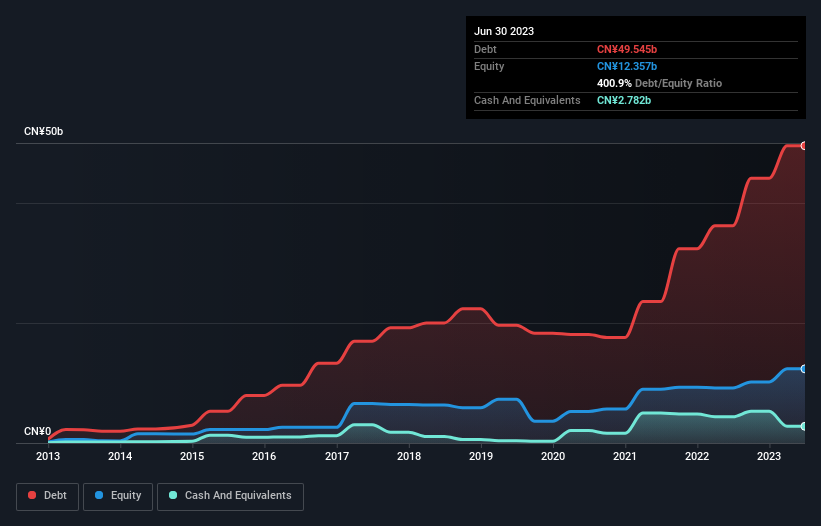- Hong Kong
- /
- Renewable Energy
- /
- SEHK:686
Is Beijing Energy International Holding (HKG:686) A Risky Investment?

Warren Buffett famously said, 'Volatility is far from synonymous with risk.' So it might be obvious that you need to consider debt, when you think about how risky any given stock is, because too much debt can sink a company. We note that Beijing Energy International Holding Co., Ltd. (HKG:686) does have debt on its balance sheet. But the real question is whether this debt is making the company risky.
When Is Debt Dangerous?
Generally speaking, debt only becomes a real problem when a company can't easily pay it off, either by raising capital or with its own cash flow. Ultimately, if the company can't fulfill its legal obligations to repay debt, shareholders could walk away with nothing. While that is not too common, we often do see indebted companies permanently diluting shareholders because lenders force them to raise capital at a distressed price. Of course, the upside of debt is that it often represents cheap capital, especially when it replaces dilution in a company with the ability to reinvest at high rates of return. When we think about a company's use of debt, we first look at cash and debt together.
View our latest analysis for Beijing Energy International Holding
What Is Beijing Energy International Holding's Net Debt?
As you can see below, at the end of June 2023, Beijing Energy International Holding had CN¥49.5b of debt, up from CN¥36.2b a year ago. Click the image for more detail. However, because it has a cash reserve of CN¥2.78b, its net debt is less, at about CN¥46.8b.

How Strong Is Beijing Energy International Holding's Balance Sheet?
Zooming in on the latest balance sheet data, we can see that Beijing Energy International Holding had liabilities of CN¥16.0b due within 12 months and liabilities of CN¥40.4b due beyond that. Offsetting these obligations, it had cash of CN¥2.78b as well as receivables valued at CN¥12.1b due within 12 months. So its liabilities outweigh the sum of its cash and (near-term) receivables by CN¥41.5b.
The deficiency here weighs heavily on the CN¥2.83b company itself, as if a child were struggling under the weight of an enormous back-pack full of books, his sports gear, and a trumpet. So we'd watch its balance sheet closely, without a doubt. At the end of the day, Beijing Energy International Holding would probably need a major re-capitalization if its creditors were to demand repayment.
We measure a company's debt load relative to its earnings power by looking at its net debt divided by its earnings before interest, tax, depreciation, and amortization (EBITDA) and by calculating how easily its earnings before interest and tax (EBIT) cover its interest expense (interest cover). The advantage of this approach is that we take into account both the absolute quantum of debt (with net debt to EBITDA) and the actual interest expenses associated with that debt (with its interest cover ratio).
Weak interest cover of 1.3 times and a disturbingly high net debt to EBITDA ratio of 12.4 hit our confidence in Beijing Energy International Holding like a one-two punch to the gut. This means we'd consider it to have a heavy debt load. On the other hand, Beijing Energy International Holding grew its EBIT by 28% in the last year. If it can maintain that kind of improvement, its debt load will begin to melt away like glaciers in a warming world. When analysing debt levels, the balance sheet is the obvious place to start. But it is Beijing Energy International Holding's earnings that will influence how the balance sheet holds up in the future. So if you're keen to discover more about its earnings, it might be worth checking out this graph of its long term earnings trend.
Finally, a business needs free cash flow to pay off debt; accounting profits just don't cut it. So we always check how much of that EBIT is translated into free cash flow. During the last three years, Beijing Energy International Holding burned a lot of cash. While that may be a result of expenditure for growth, it does make the debt far more risky.
Our View
On the face of it, Beijing Energy International Holding's conversion of EBIT to free cash flow left us tentative about the stock, and its level of total liabilities was no more enticing than the one empty restaurant on the busiest night of the year. But at least it's pretty decent at growing its EBIT; that's encouraging. After considering the datapoints discussed, we think Beijing Energy International Holding has too much debt. While some investors love that sort of risky play, it's certainly not our cup of tea. There's no doubt that we learn most about debt from the balance sheet. However, not all investment risk resides within the balance sheet - far from it. For example, we've discovered 3 warning signs for Beijing Energy International Holding (2 are concerning!) that you should be aware of before investing here.
If you're interested in investing in businesses that can grow profits without the burden of debt, then check out this free list of growing businesses that have net cash on the balance sheet.
Valuation is complex, but we're here to simplify it.
Discover if Beijing Energy International Holding might be undervalued or overvalued with our detailed analysis, featuring fair value estimates, potential risks, dividends, insider trades, and its financial condition.
Access Free AnalysisHave feedback on this article? Concerned about the content? Get in touch with us directly. Alternatively, email editorial-team (at) simplywallst.com.
This article by Simply Wall St is general in nature. We provide commentary based on historical data and analyst forecasts only using an unbiased methodology and our articles are not intended to be financial advice. It does not constitute a recommendation to buy or sell any stock, and does not take account of your objectives, or your financial situation. We aim to bring you long-term focused analysis driven by fundamental data. Note that our analysis may not factor in the latest price-sensitive company announcements or qualitative material. Simply Wall St has no position in any stocks mentioned.
About SEHK:686
Beijing Energy International Holding
An investment holding company, engages in the investment, development, operation, and management of power plants and other clean energy projects in the People’s Republic of China, Australia, and Vietnam.
Solid track record unattractive dividend payer.
Market Insights
Community Narratives



